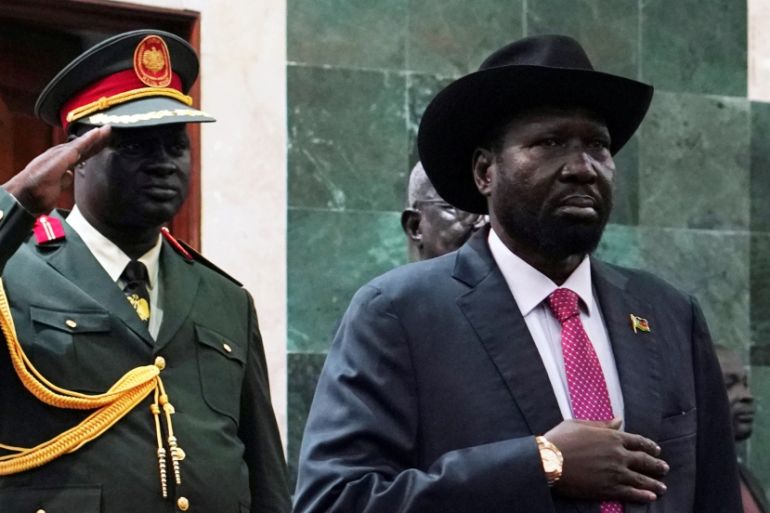South Sudan’s Kiir bans singing of anthem in his absence
Minister Michael Makuei says with exception of embassies and schools, anthem will only be sung in Kiir’s presence.

South Sudan‘s President Salva Kiir has banned anyone from singing the national anthem unless he is present, according to a government minister.
Information Minister Michael Makuei told AFP news on Monday that different leaders and institutions were playing the anthem at whim, which was an abuse of the national tune, written shortly before independence in 2011.
“For the information of everybody the national anthem is only meant for the president, in a function only attended by the president, not for everybody,” Makuei said.
“We are seeing now even a minister, undersecretary, even governor or state minister, whenever there is a function, the national anthem is sung.”
He said Kiir’s order was passed during a cabinet meeting on Friday.
Makuei said that with the exception of South Sudan’s embassies, which represented the president, and schools where children are taught the anthem, no one was allowed to sing the song in Kiir’s absence.
The minister said that military leaders had also been banned from addressing the public when in uniform.
He did not give details on what the punishment would be if the orders were not followed.
“These are orders and of course when you disobey the orders of the president then you carry your cross,” Makuei said.
Civil war
South Sudan gained independence from its northern neighbour Sudan in 2011 after years of war pitting rebel groups against Khartoum.
In 2013, South Sudan descended into a ruinous civil war after Kiir sacked his entire cabinet and then-deputy, Riek Machar, over accusations he had plotted a coup.
Ethnically charged fighting soon spread from the capital, Juba, across the impoverished state, shutting down oil fields, forcing millions to flee and killing tens of thousands of people.
The conflict split the country along ethnic lines and has seen mass rape, the forced recruitment of child soldiers and attacks on civilians.
It has caused one of the world’s greatest humanitarian crises and wrecked the economy in a country which relies on oil production for the bulk of its revenues.
A power-sharing deal that returned Machar to the vice presidency was signed in 2015. But it collapsed a year later in a deadly battle that saw Machar flee into exile.
The rebel leader and former vice president was due to return to Juba in May after the signing of a new peace deal in September last year aimed at ending the war.
The deal, under which Machar is to return from exile to serve as vice president in a power-sharing government, has suffered heavy delays.
|
|